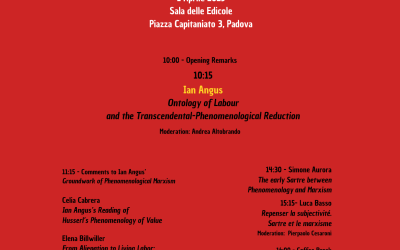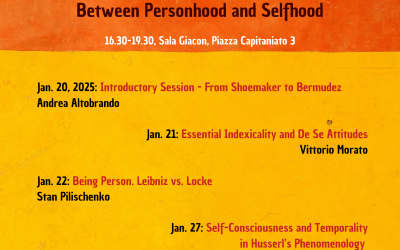Groundworks and Perspectives
homo individualis is a kind of sub-species of human animal whose members are conscious of themselves as something unique, irreducible to mere physical, biological, mental, or social factors, and inherently valuable in their particular individuality.
The ‘Homo Individualis’ project posits that members of this cultural species are the real or ideal protagonists of ‘modern’ societies and many of their fundamental institutions (freedom of expression, freedom of thought, human rights, etc.). The project aims to investigate the structure of self-consciousness that characterizes these entities, understand its conditions of possibility, and identify its socio-ethical-political implications and horizons.
Events
Research Outputs
Riconoscimento e forme della relazione
by Fabio Mazzocchio
—
Thinking about recognition, within the dynamism of relationships, opens the space to identify the transcendental condition of ethics: considering the other as a subject characterized by his own dignity. In this sense, the book places in the dynamics of recognition the primary sign of the constitution of subjectivity, of the relationship and of common life. In relationships, in fact, we become aware of ourselves. Through this point of view, the text highlights the existential importance of recognition, as a orienting force for ethics and for human intersubjectivity.
Agisci su te stesso
by Marco Deodati
–
The main idea of the paper is that the analysis of what can be broadly defined as “self-awareness” is strictly connected to practical and existential issues, insofar as the latter enable the concrete individuation of the self. This is an interpretative juncture where psychology, phenomenology and clarification of existence fruitfully intersect, reflecting the attention to complexity that characterises Jaspers’ best investigations. The theoretical gain of this reading can be assessed from two interrelated perspectives: on the one hand, it presents an experience of the self which, since it cannot be reduced to a simple logical, self-perceptive or self-representative function, is originally inseparable from the volitional dimension that identifies the existing subject; on the other hand, conversely, it allows us to consider freedom precisely starting from the intrinsic limits of the theoretical-objectifying modes of self-consciousness, following Jaspers’ criticism to the classical disputes of Western thought. From this point of view, being oneself appears as a form of practical self-consciousness identified in the will to unfold one’s own possibilities.
Il punto di vista dell’io
by Filippo Nobili
—
The paper examines the “I” and its relationship to the stream of consciousness in Husserl’s genetic phenomenology. Examining the manuscripts from the late 1910s to the early 1930s, the source of the alleged inconsistencies concerning Husserlian egology is found in the failure to distinguish the twofold movement – deconstructive and reconstructive – of genetic analysis. Starting from this methodological distinction, the fundamental continuity of Husserl’s reflection on the ego and the progressive integration and concretization of Ichfrage and Zeitfrage is revealed. The status of the notion of Ur-Ich and the genesis of the ego as such can thus be clarified in perspectival terms. The phenomenon of centralization (Zentralisierung) of intentional life establishes, within the stream of consciousness, a point of view (focus) that coincides with the actualization in the foreground (Vordergrund) of the thematic lived experience on the basis of a merely operative and potential background (Hintergrund).
Resources for researchers
Individualism and the Mental
Essais sur l’individualisme. Une perspective anthropologique sur l’idéologie moderne.
L’idéologie moderne se caractérise par la subordination de la réalité sociale à l’individu, considéré comme un être absolument indépendant et autonome. Cette idéologie distingue les sociétés occidentales des autres, qui, au contraire, subordonnent l’individu à la...
Sartre & Beauvoir on Feminism & Relationships
Jean-Paul Sartre and Simone de Beauvoir discuss feminism, relationships, and children. And then they play checkers.



